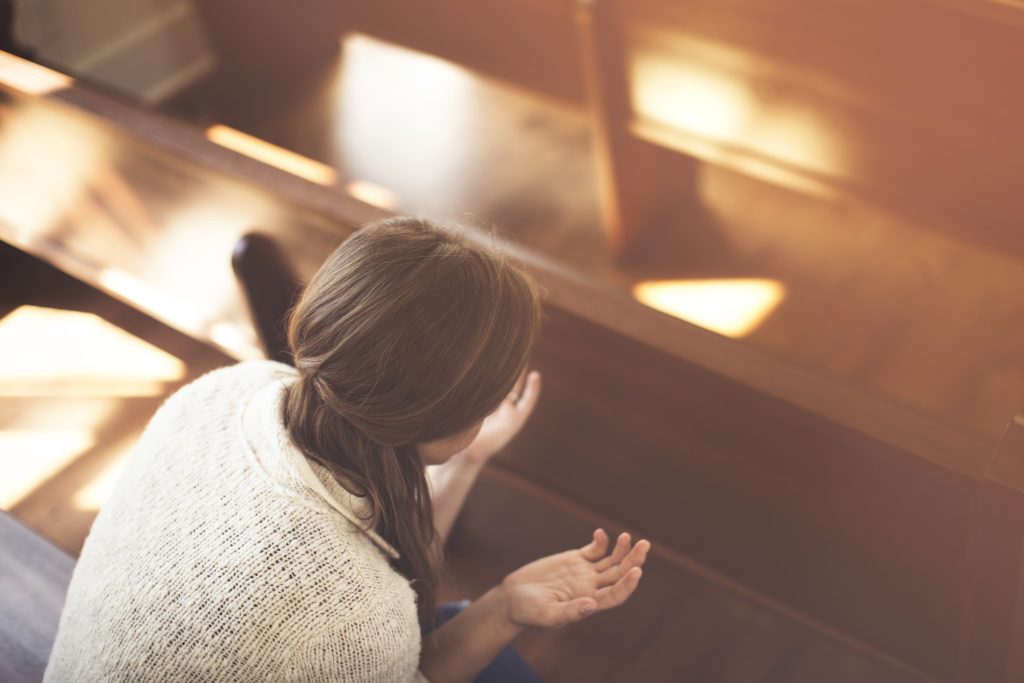Three years have passed since the United Nation’s World Health Organization (WHO) first called the COVID-19 outbreak a pandemic on March 11, 2020. The ubiquitous lockdowns began the next week.
The WHO says the emergency is still ongoing, with the virus still spreading and totaling nearly 7 million deaths worldwide. Yet, with daily losses and lockdowns behind them, most people have resumed their somewhat normal lives, thanks to a porous wall of immunity built from infections and vaccines.
Meanwhile, many people are looking back at what and who they lost, and in some cases gained, and what dynamic changes they have had to make or endure in many aspects of their lives. Numerous surveys indicate increases in anxiety, grief, depression, criminal behavior, substance abuse and suicides. However, while some have sadly lost their hopefulness in the future, others have regained it, as they have adapted to changes and sought a deeper religious faith for their lives.
Members of First United Methodist Church in Westfield, N.J., surveyed that post-pandemic, emotional landscape during worship on Sunday, March 19, in a service of personal lament that seemed to touch and heal many hearts. Learn more.
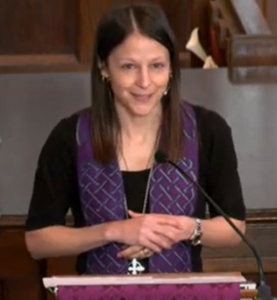
Rev. Alison V. Philip
First, the Rev. Alison V. Philip, Senior Pastor, preached with profound insight about loss that finds healing in the midst of lament. “If we don’t grieve the loss, we risk not being able to see what God is doing now. And God is doing so much now. God is opening eyes and God is bringing joy. God is doing a new thing.”
Then Connie Palmer, a Certified Lay Speaker, led the congregation in a time of reflection and prayer that focused on “remembering what we lost in the pandemic, what it opened our eyes to see, and what gives us hope for the future.”
She recalled the devastating virus, the countless deaths near and far, and the widespread, collective fear that erupted and prevailed with Covid’s unrelenting spread.
“Brothers and sisters in Christ, today we take a moment for lament,” she announced. “Laments are found throughout the Hebrew scriptures. Jesus quoted the lament in Psalm 22 as he was dying on the cross. A lament is prayer, a crying out to God, a time to name our losses and have our eyes opened to where God was in the midst of the pandemic. Where did we see God at work? What has God helped us to see more clearly? What have we lost?”
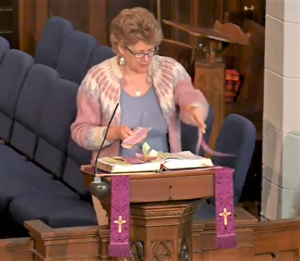
Connie Palmer reads members’ reflections on strips of paper. (Screenshot from YouTube video)
After Good Friday comes the Resurrection, Palmer reminded the congregation, calling on members to “name the reasons for our hope in how God is, was and will be at work in our lives and in our world.” Ushers handed out strips of paper in three colors for worshipers to use for writing down their losses, their divinely inspired revelations and their hopes in a future with God.
The colorful strips were collected, as though woven together, and brought to Palmer in the pulpit to read aloud.
Before reading the recorded losses, she said, “Dear Jesus, a man of sorrows, acquainted with deepest grief, to you we name our losses, and as we do we trust that you walk with us and comfort us in this valley of the shadow.”
Before reading the revelations, she said, “God, you see what we cannot. Thank you for opening our eyes to see.”
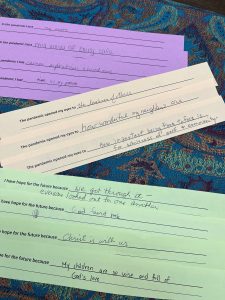 Before reading the signs of hope, she said, “Your love, O Lord, is what gives us hope. You have told us that nothing can separate us from your love.” Your love, O Lord, is what gives us hope. We now name our reasons for hope….”
Before reading the signs of hope, she said, “Your love, O Lord, is what gives us hope. You have told us that nothing can separate us from your love.” Your love, O Lord, is what gives us hope. We now name our reasons for hope….”
The quiet ceremony took time; but many said later that it was time well spent.
“People commented that it gave them a space that they haven’t had elsewhere to lament losses of the past years, to find meaning and celebrate hope,” said Pastor Philip. Some said hearing that others shared similar feelings made them feel less alone.
She shared one member’s comment that, “Coming out of the pandemic, everything just kept moving forward; but I hadn’t really had space to sit and reflect on the enormity of it…looking back three years later. I’m grateful the church offered that to people.”
Another person found hope in hearing the children’s choir “sing the good news to us.” Indeed, the young choir sang an ideal anthem for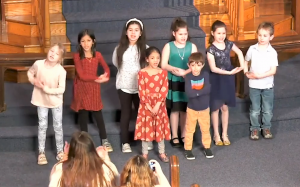 the occasion: “He’s Got the Whole World in His Hands.” And the closing hymn of the service was no less ideal: “Be Thou My Vision.”
the occasion: “He’s Got the Whole World in His Hands.” And the closing hymn of the service was no less ideal: “Be Thou My Vision.”
“The idea to do a corporate lament came to me while in a lay servant training a few weeks ago,” said Palmer later shared. “Having written some laments regarding my own losses I knew their power. Even though it took a lot of time to read each slip of paper, people expressed how powerful it was to voice how they have been impacted and where they saw God at work. I do think the church is exactly the right space to name the impact of that experience and bring meaning to such meaningless suffering.”
Palmer believes other churches that try doing a service of lament in this post-pandemic period may find it beneficial. “I do think it is important to normalize the grief that we are all still feeling from all the losses we have experienced.
A former clinical training director and now a consultant for Imagine, a Center for Coping with Loss, located in Mountainside and Newark, she has done grief education for schools, workplaces, churches and community organizations and also for Drew Theological Seminary’s Professional Development Program for pastors. “Many pastors said this content should have been a part of their seminary education.” The course she offers to churches is titled “Listening with Love: Congregations Coping with Loss.”
View the YouTube recording of First UMC’s March 19 worship. The service of lament begins at about 47 minutes, 40 seconds (47:40).

